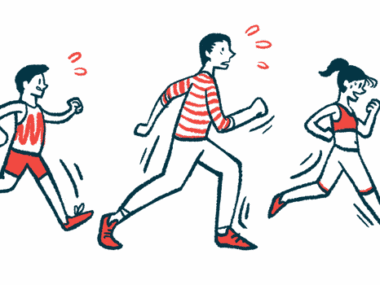Exercise has played a crucial role in my life with cystic fibrosis
For me, staying consistent with a slow, simple routine was key
Written by |

We all know that exercise plays an important role in physical and mental health. But as someone with cystic fibrosis (CF), I believe that exercise is as vital as the medicines I take.
When I was young, my pediatric CF physician encouraged my mom to keep me active. He suggested I get involved in sports, not only for muscle strengthening but also to help with airway clearance.
Throughout elementary and middle school I played on basketball and softball teams. I looked the healthiest I ever had, thanks to the increase in weight and muscle mass. But by the end of practice or a game, I’d be the only one whose hair and uniform were soaked with sweat — a result of my sodium and chloride channel dysfunction.
During high school, I fell off the team sports wagon, but returned again as a young adult with my local women’s softball league. I’d debated with my doctor about whether my nursing job and housecleaning qualified as exercise, but I lost those debates, to my dismay.
Slow and steady wins the race
Although I struggled to stay consistent with cardio, I kept a treadmill and hand weights in my bedroom for motivation. Because I live in the Northeast, where we experience all four seasons, the treadmill became my go-to workout. I could use it regardless of the weather and control the speed and incline.
As my lung function slowly declined over the years, it became increasingly difficult to exercise. I’d walk slowly on the treadmill while doing my nebulizer breathing treatments. I’d do sit-to-stands with a chair or use hand weights while doing my Vest or electronic percussive airway clearance.
By the time I was referred for a double-lung transplant evaluation, I struggled to walk on the treadmill for more than a few minutes. I lost weight and a lot of muscle mass. The strong legs I’d grown up with were gone. Performing activities of daily living like showering or dressing left me out of breath and in need of frequent rest periods. I started using oxygen 24 hours a day.
My transplant team encouraged me to exercise, as building my strength and endurance before surgery would be paramount for an easier recovery. Despite having very little energy, I pushed myself to include exercise in my daily routine.
On the first day I returned to my treadmill, I walked for two minutes and had to stop. I was out of breath and my legs were burning. The following day was the same. On the third day, I pushed myself to walk for three minutes. From there, I increased my time by one minute every few days. Those tiny increments added up, and I before I knew it I was tolerating 20-30 minutes at a time. My lung function remained poor, and I could feel that my cough was getting stronger, but my leg strength and gastrointestinal function improved.
I started to include some basic body and weight strength training into my routine. The slow, simple, repetitive movements, which I did on the floor, were doable, even with my poor lung function. I slowly started feeling stronger and noticed my spirits were improving.
I was officially listed for transplant three years after being referred to the transplant team at my CF care center. I continued my routine of walking on the treadmill, using hand weights, and doing floor exercises, and after 21 months on the waitlist, I received my new lungs in September 2020.
While I was recovering in the hospital, the physical therapist performed ultrasounds on my leg muscles for a transplant study. He asked what I had done for exercise pre-transplant, noting my quadricep muscles were “perfect.” He stressed the importance of continuing my regimen post-transplant.
At that moment, all of the hard work I had put in was worth it to me. I feel it helped me push through my recovery.
All that is to say, exercise is especially important for those living with cystic fibrosis. Of course, you should always consult your doctor about which types of exercise are safe for you. But despite whatever limitations you may be facing, know that even the smallest movement and goal can get the ball rolling for you. Slow and steady wins the race, and that mindset helped me to avoid overdoing it and experience slow but consistent improvement.
No matter how slow you go, be proud of yourself for starting. No matter how many times you may stop and restart, be proud of yourself for continuing to try. The most important accomplishment is not giving up.
What is your favorite type of exercise, and how has it helped you throughout your cystic fibrosis journey? Please share in the comments below.
Note: Cystic Fibrosis News Today is strictly a news and information website about the disease. It does not provide medical advice, diagnosis, or treatment. This content is not intended to be a substitute for professional medical advice, diagnosis, or treatment. Always seek the advice of your physician or other qualified health provider with any questions you may have regarding a medical condition. Never disregard professional medical advice or delay in seeking it because of something you have read on this website. The opinions expressed in this column are not those of Cystic Fibrosis News Today or its parent company, Bionews, and are intended to spark discussion about issues pertaining to cystic fibrosis.








Tim Blowfield
Exercise has long been recommended for pwCF as beneficial and it is beneficial. It certainly helps with wellbeing and lung health but why? Is it just that persons who exercise are fitter or is there an intrinsic feature in CF that requires 'extra' exercise in pwCF to get muscle strength. I suspect the latter, that abnormal electrolytes within the cytoplasm of the muscle cell means that the muscles of pwCF are intrinsically a little weaker and need 'more training'. With the faulty CFTR protein chloride is expected to be high within all cells including muscles. As the cytoplasm is a balanced electrolyte solution the high Chloride anion will be balanced by high cations [Potassium (K), Calcium (Ca) etc] resulting in abnormal cell function.
Other organs appear to be affected by this abnormally high intracellular electrolytes and be the cause of many of the co-morbidities pwCF have.
While the lungs must not be neglected more research is needed to understand the effect of the faulty Chloride channel in orher cells and organs.
Jennifer Bleecher
Thank you for your very thoughtful and interesting comment! There are so many areas that need more research and understanding in this CF life as we are living longer. I wish we had all the answers now!
Seth Reno
Truley inspiring!
Jennifer Bleecher
Thank you Seth! Best to you!